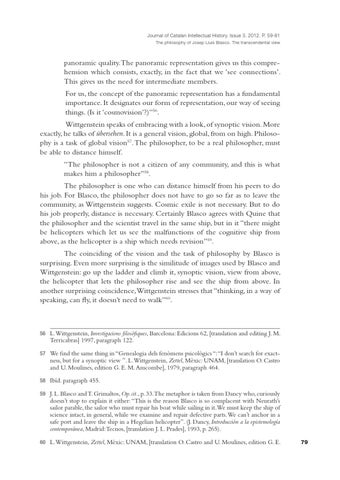Journal of Catalan Intellectual History. Issue 3. 2012. P. 59-81 The philosophy of Josep Lluís Blasco. The transcendental view
panoramic quality.The panoramic representation gives us this comprehension which consists, exactly, in the fact that we ‘see connections’. This gives us the need for intermediate members. For us, the concept of the panoramic representation has a fundamental importance. It designates our form of representation, our way of seeing things. (Is it ‘cosmovision’?)”56. Wittgenstein speaks of embracing with a look, of synoptic vision. More exactly, he talks of übersehen. It is a general vision, global, from on high. Philosophy is a task of global vision57. The philosopher, to be a real philosopher, must be able to distance himself. “ The philosopher is not a citizen of any community, and this is what makes him a philosopher”58. The philosopher is one who can distance himself from his peers to do his job. For Blasco, the philosopher does not have to go so far as to leave the community, as Wittgenstein suggests. Cosmic exile is not necessary. But to do his job properly, distance is necessary. Certainly Blasco agrees with Quine that the philosopher and the scientist travel in the same ship, but in it “there might be helicopters which let us see the malfunctions of the cognitive ship from above, as the helicopter is a ship which needs revision”59. The coinciding of the vision and the task of philosophy by Blasco is surprising. Even more surprising is the similitude of images used by Blasco and Wittgenstein: go up the ladder and climb it, synoptic vision, view from above, the helicopter that lets the philosopher rise and see the ship from above. In another surprising coincidence, Wittgenstein stresses that “thinking, in a way of speaking, can fly, it doesn’t need to walk”60.
56 L. Wittgenstein, Investigacions filosòfiques, Barcelona: Edicions 62, [translation and editing J. M.
Terricabras] 1997, paragraph 122.
57 We find the same thing in “Genealogia dels fenòmens psicològics “: “I don’t search for exact-
ness, but for a synoptic view ”. L. Wittgenstein, Zettel, Mèxic: UNAM, [translation O. Castro and U. Moulines, edition G. E. M. Anscombe], 1979, paragraph 464.
58 Ibíd. paragraph 455. 59 J. L. Blasco and T. Grimaltos, Op. cit., p. 33.The metaphor is taken from Dancy who, curiously
doesn’t stop to explain it either: “This is the reason Blasco is so complacent with Neurath’s sailor parable, the sailor who must repair his boat while sailing in it.We must keep the ship of science intact, in general, while we examine and repair defective parts. We can’t anchor in a safe port and leave the ship in a Hegelian helicopter”. (J. Dancy, Introducción a la epistemología contemporánea, Madrid: Tecnos, [translation J. L. Prades], 1993, p. 265).
60 L. Wittgenstein, Zettel, Mèxic: UNAM, [translation O. Castro and U. Moulines, edition G. E.
79
